Economic growth, employment and inflation. Poverty and inequality. Infrastructure and development. Climate change and sustainable development.
They were the four designated topics at Mexico’s second presidential debate on Sunday night, but personal attacks and accusations of corruption were also a prominent aspect of the encounter between the three candidates five weeks ahead of the June 2 election.
Xóchitl Gálvez, candidate for a three-party opposition bloc, went on the offensive early, accusing front-runner and ruling party aspirant Claudia Sheinbaum of being the candidate for a “narco-party” and repeatedly referring to her as “the candidate of lies.”
Sheinbaum, who is aiming to perpetuate the so-called “fourth transformation” of Mexico initiated by her political mentor President Andrés Manuel López Obrador, dubbed her rival “la corrupta” (the corrupt one) and frequently highlighted that she represents parties that were previously in power and therefore stands for an “old” economic model “that already failed.”
The third candidate, Jorge Álvarez Máynez of the minor Citizens Movement party, stayed above the fray more than his two rivals, although he too launched a number of verbal attacks, more of which were directed at Gálvez.
During a two-hour debate in Mexico City, the aspirants were tasked with responding to questions from citizens. The format also allowed the candidates to directly interact with each other to a greater extent than was possible in the first debate.
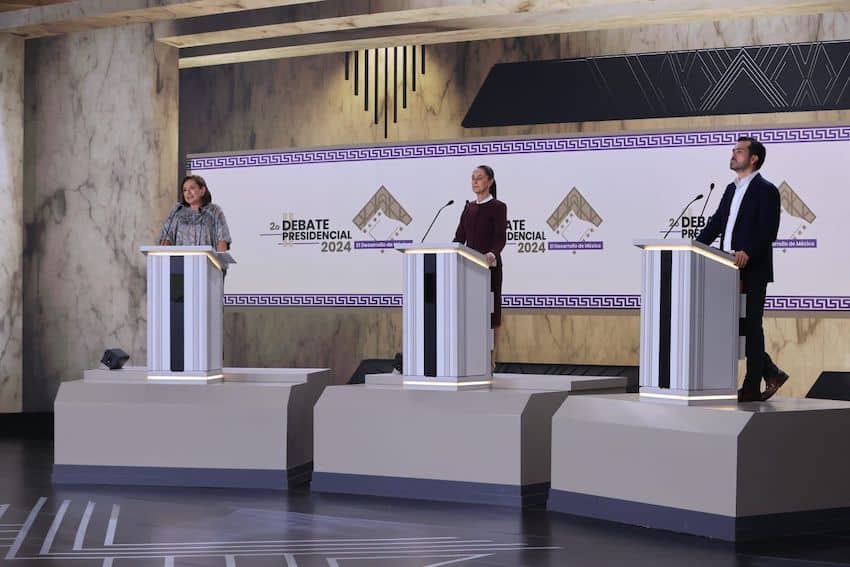
Gálvez was a more assured debater on Sunday than she was three weeks earlier, and a number of commentators declared her the winner. However, numerous other analysts contended that Sheinbaum — who has a commanding lead in the polls — triumphed.
The economy
Economic issues are front and center in the lead-up to the June 2 elections, in which Mexicans will not only elect a new president but also thousands of municipal, state and federal representatives.
Gálvez: Candidate for the National Action Party (PAN), the Institutional Revolutionary Party (PRI) and the Democratic Revolution Party (PRD)
The opposition bloc candidate highlighted that prices for a range of basic products such as tortillas and eggs have increased significantly during the current government, and emphasized that many Mexicans are unable to make ends meet.
“The main economic problem for Mexicans is extortion,” she said, claiming that criminals cause prices to rise by demanding regular payments from businesses across a range of different sectors.
“The criminals already have a party. Morena has become a narco-party,” Gálvez said.
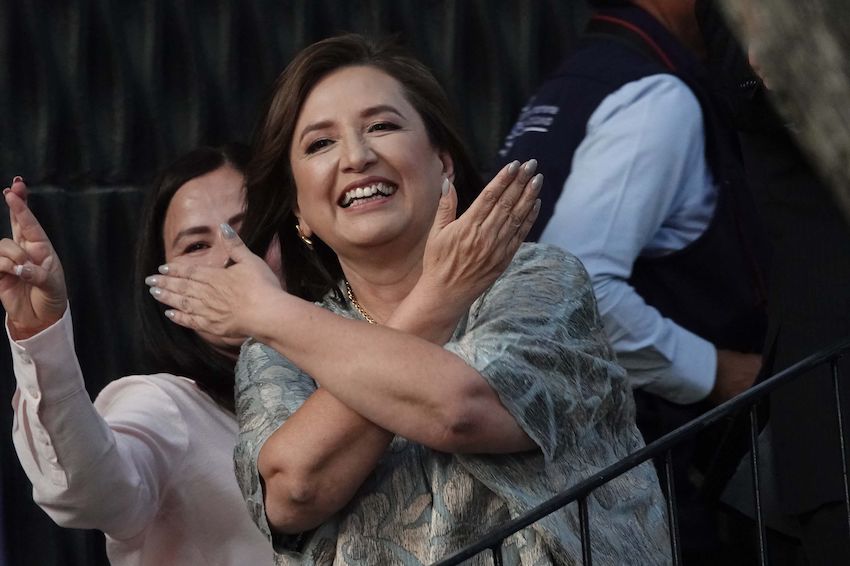
“… Morena abandoned you by not combating crime. So that prices of products go down, I’m going to punish the criminals, extortion will end,” she said.
The candidate also said that a government she leads will get to “work so that you have a good job.”
In addition, it will “take advantage of the relocation of companies,” Gálvez said, referring to the growing nearshoring trend.
Among the candidate’s specific economic proposals was one to eliminate income tax for workers who earn less that 15,000 pesos (US $880) per month, a measure she said would benefit 20 million Mexicans.
Gálvez also pledged to create a government institute that will provide loans to entrepreneurs.
“We’re going to support you with cheap credit, with training. Of the three of us, the only one who knows how to create jobs is me,” said the tech entrepreneur turned politician.
Sheinbaum: candidate for the National Regeneration Movement (Morena), the Labor Party (PT) and the Ecological Green Party of Mexico (PVEM)
The Morena candidate spent considerable time defending the economic record of the current government, highlighting that the economy has grown at a faster rate than during the so-called “neoliberal” period and that the minimum wage has more than doubled.
“These are not words nor lies, they are facts,” Sheinbaum said.
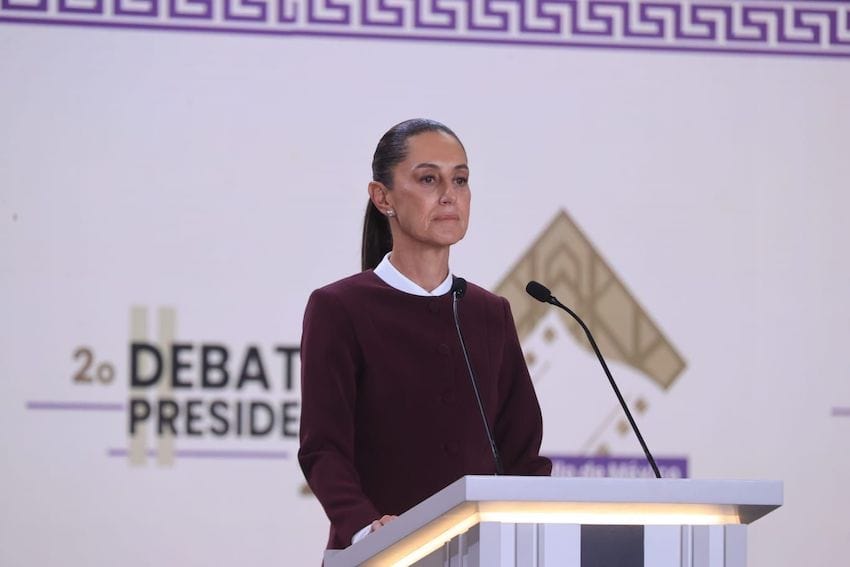
The former Mexico City mayor acknowledged that there is still work to do, and committed to closing the salary gap between men and women, making additional increases to the minimum wage and building 100 industrial parks in order to capitalize on the nearshoring phenomenon.
Inflation remains above the Bank of México’s target, but Sheinbaum asserted that it is “under control,” in part due to the government’s work to ensure that the price of gasoline is “accessible.”
The leading contender said that her main rival “has accepted that she is the candidate of the PRI and the PAN, of the old model, of the past, of the neoliberalism that already failed.”
For her part, Sheinbaum plans to continue López Obrador’s so-called “Mexican humanism” model of governance.
“… We represent the transformation and the transformation has given well-being to the people of Mexico. That’s why we’re going to continue with the transformation and advance with the transformation,” she said.
Álvarez Máynez: candidate for the Citizens Movement (MC) party
The 38-year-old former federal lawmaker asserted that the two states governed by the MC — Jalisco and Nuevo León — are Mexico’s job creation powerhouses.
Jalisco and Nuevo León have implemented a model that has yielded results, with investment, with decent jobs for the people,” said Máynez, as the candidate prefers to be known.
“That is the model with which we are going to govern the country,” he said.
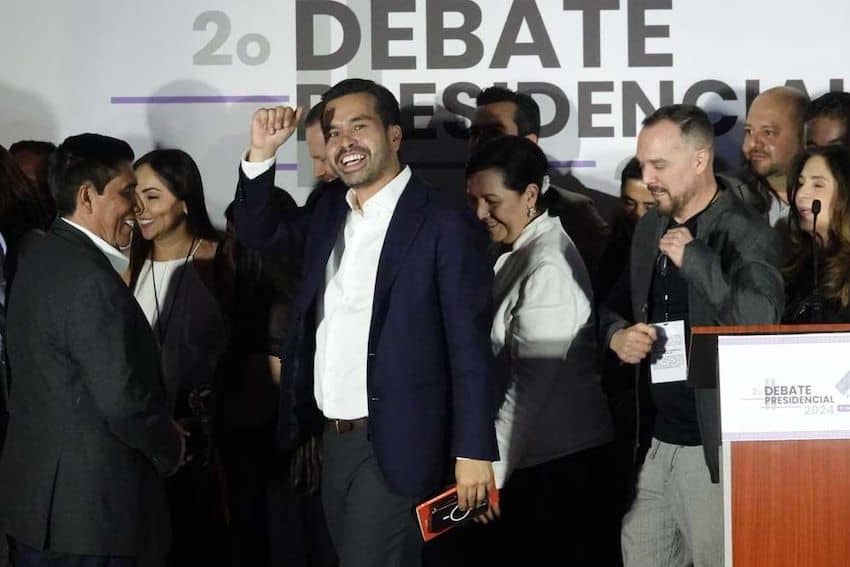
Máynez, who is in a distant third place in the polls, pledged to raise the minimum wage to 10,000 pesos ($590) per month, an increase of around 33% from its current level.
He also highlighted that he is in favor of initiatives such as a five-day, 40-hour working week (Monday-Saturday is currently standard) and increasing the length of paternity leave.
With regard to nearshoring, Máynez said that Mexico can take advantage of the opportunity if it combats insecurity, invests in renewable energy, addresses water scarcity and carries out an “education revolution that allows equality of opportunities so that everyone is part of the prosperity.”
Among his other economic proposals was one to provide students with free access to “concerts, books, artistic shows, theater and dance” performances.
“In that way we’re going to educate an audience who will continue consuming culture throughout their whole life [and] strengthen the creative industries … that today are practically abandoned,” Máynez said.
Other proposals and remarks
Gálvez:
The PAN-PRI-PRD candidate declared that she wants to build a “united Mexico without hate, without division — a Mexico without poverty, …[with citizens] who can go out to the street without feeling fear.”
She sought to land an early blow on Sheinbaum by referring to her as “the candidate for a narco-party.”
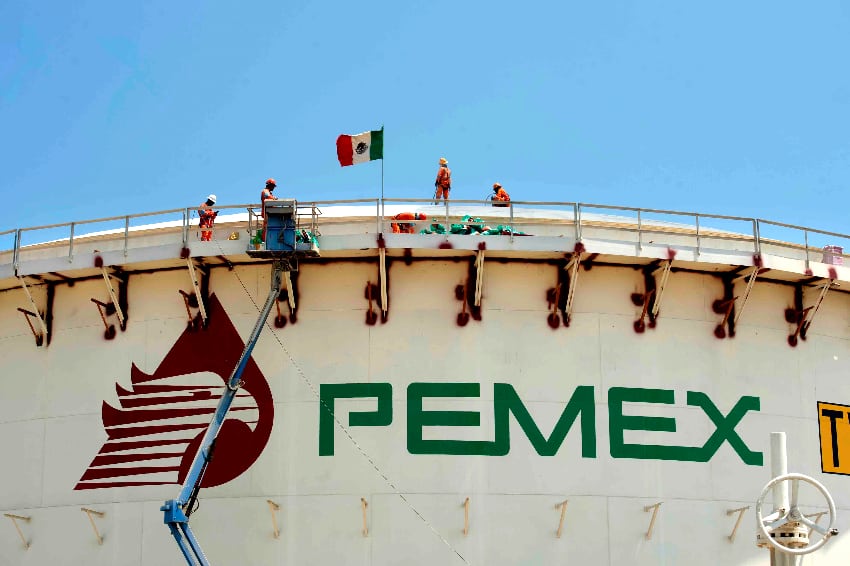
While Gálvez accuses the Morena government of being soft on crime with its non-confrontational “hugs, not bullets” security strategy, at the beginning of the debate she supported her “narco-party” claim by noting that the ruling party had promoted a T-shirt featuring Santa Muerte (Holy Death).
While she spent a significant amount of time attacking Sheinbaum for her alleged dishonesty, and asserting she is to blame for poor water quality in parts of Mexico City, the collapse of a school during a powerful 2017 earthquake and the 2021 metro disaster, the PAN-PRI-PRD candidate also outlined a number of undertakings and proposals.
- She pledged to maintain the current government’s welfare and social programs — and “strengthen” them. “I know how poverty hurts,” she said before indicating that she agreed with López Obrador’s maxim “For the good of all, the poor come first.”
- She committed to building a range of public works including water, renewable energy, health care and education projects. She said her government would listen carefully to determine “regional needs” before going ahead with projects.
- She promised that a government she leads would not privatize Pemex — as Sheinbaum claimed it would — and pledged to stanch the state oil company’s economic losses. “Pemex is going to be a company with a new business model in which money is invested where it is profitable, which is … [in oil] exploration,” she said.
- She pledged that a government she leads would comply with Mexico’s international commitments to mitigate climate change. “This government is a government of oil, of fuel oil. … My bet is on renewable energy,” she said.
Sheinbaum:
“The only declared narco-government that has existed is that of Felipe Calderón, of the PAN,” the Morena candidate declared in response to accusations leveled at her by Gálvez.
Sheinbaum repeatedly referred to her main rival as “the PRIAN candidate” in an attempt to link here to previous PRI and PAN government she characterized as corrupt and self-serving.

Under those governments, there were “privatizations with corruption, conversions of private debt into public debt, … starvation pensions, low salaries and tax increases,” she said.
“In contrast, the transformation model, which began with this government, is a humanist model, an honest model … with better salaries and better pensions without raising taxes. There have been programs for well-being and strategic projects for national development,” said Sheinbaum, who leaned heavily on her closeness to López Obrador and association with his administration.
The Morena candidate accused Gálvez of acting illegally to obtain contracts for her companies when she was a senator, mayor of the Mexico City borough of Miguel Hidalgo and director of the federal Indigenous people’s agency during the 2000-06 presidency of Vicente Fox. She subsequently referred to the PAN-PRI-PRD candidate as “la corrupta.“
“From now on [I’ll call you] narco-candidate,” shot back Gálvez, who denied all accusations of corruption.
Sheinbaum also denied the allegations her main rival made against her, and outlined a range of initiatives she would undertake if she wins the election and succeeds López Obrador on Oct. 1.
- She pledged to maintain the government’s social programs, increase their payments above the level of inflation on an annual basis and enshrine them in the constitution. “It’s false that the PRIAN candidate will maintain them,” she asserted.
- She committed to extending social security benefits to agricultural day laborers known as jornaleros.
- She pledged to implement a National Water Plan that will include “the application of technology” in the agricultural sector in order to “release water for human consumption” and “produce more food.” She also pledged to lead a government that is committed to recycling more water.
- She promised to “develop 18,000 kilometers of rail tracks” so that passenger trains can run on them.
- She pledged to “make progress on the energy transition,” highlighting that as mayor of Mexico City she carried out renewable projects such as the installation of solar panels on the capital’s main wholesale market.

Máynez:
The MC candidate said that his party is “committed to making changes in this country that favor the majority” of people.
- He said that a government he leads would turn the Special Tax on Production and Services into a “green tax” with revenue going to “electro-mobility and public transport” projects. He also promised to implement solar panels on government buildings such as schools.
- He pledged to extend scholarships for students for a year after they complete high school or university to assist them as they make the transition to the workplace.
- He argued that “the new generations” should not just have access to pensions when they retire, but also social housing via a program that guarantees the right to a home.
- He pledged to increase public investment and dedicate additional resources to a “national regional development program” so that infrastructure works “reach the whole country.”
- He said that a government he leads would make support for the agricultural sector a priority. “We have to provide justice to those who fill our tables with food. But without water there is no countryside. That’s why the main problem we have to fix in terms of infrastructure is … water,” he said.
The three candidates will face off in one final debate on May 19, exactly two weeks before voters go to the polls to elect a new president for a six-year term that will conclude in 2030.
By Mexico News Daily chief staff writer Peter Davies ([email protected])
